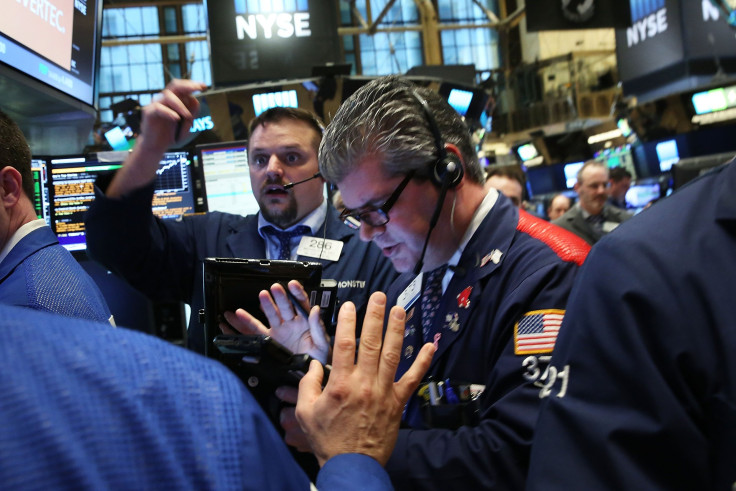Tuesday's Stock Market Open: US Equities Bounce Back From Monday’s Historic Losses

KEY POINTS
- Morgan Stanley sees base case for global recession in 2020
- France will spend $50 billion to fight economic impact of coronavirus
- The U.S. has confirmed at least 4,281 cases of coronavirus, more than 70 deaths
Update: 12:05 p.m. EDT:
U.S. stocks surged at noon after the Federal Reserve announced new measures to help companies get short-term funding during the virus outbreak.
The Dow Jones Industrial Average jumped 717.57 points to 20,906.09 while the S&P 500 gained 118.41 points to 2,504.54 and the Nasdaq Composite Index rose 376.23 points to 7,280.82.
In Europe markets closed higher as Britain’s FTSE-100 gained 1.34%, France’s CAC-40 advanced 1.23% and Germany’s DAX rose 1.13%.
The Federal Reserve unveiled a special credit facility to buy corporate paper -- involves unsecured short-term lending critical to business funding -- from issuers that have struggled finding buyers on the open market.
“This is a crucial market for basically short-term borrowing by companies, and if you don’t get this short-term borrowing, you can’t get payments out, you can’t pay your employees, you can’t pay your customers,” Randall Kroszner, a former Fed governor, told CNBC. “If this freezes up, it’s a real problem.”
The National Association of Home Builders/Wells Fargo Housing Market Index fell from 74 points in February to 72 points in March.
The Commerce Department said business inventories slipped by 0.1% in January after an unchanged reading in December.
Update: 11:25 a.m. EDT:
U.S. stocks turned higher in late morning trading as the Federal Reserve unveiled new measures to help companies get short-term funding during the virus outbreak.
The Dow Jones Industrial Average jumped 567.28 points to 20,755.80 while the S&P 500 gained 106.64 points to 2,492.77 and the Nasdaq Composite Index rose 328.11 points to 7,232.70.
Update: 9:55 a.m. EDT:
U.S. stocks turned lower, with the Dow giving back early gains
The Dow Jones Industrial Average dropped 112.21 points to 20,076.31 while the S&P 500 edged up 1.77 points to 2,387.90 and the Nasdaq Composite Index fell 4.9 points to 6,899.69.
Original story:
U.S. stocks gained at the opening on Tuesday as the White House seeks an $850 billion stimulus package to fight impact of coronavirus.
The Dow Jones Industrial Average gained 388.68 points to 20,577.20 while the S&P 500 rose 55.20 points to 2,441.33 and the Nasdaq Composite Index advanced 169.62 points to 7,074.21.
The U.S. stock market suffered one of the worst days in history on Monday, with the Dow and S&P 500 falling 12.9% and 12%, respectively. The Nasdaq plunged 12.3%.
The U.S. has recorded at least 4,281 cases of coronavirus, along with more than 70 deaths. Around the world, more than 170,000 cases have been confirmed.
The White House reportedly wants an $850 billion economic stimulus plan. The proposal will include about $50 billion for aid to the airline industry.
On Monday night, President Donald Trump tweeted: “The United States will be powerfully supporting those industries, like airlines and others, that are particularly affected by the Chinese virus. We will be stronger than ever before!”
But Trump also warned the crisis could last into August.
Some analysts are predicting a global recession.
“Global recession in 2020 is now our base case,” wrote Morgan Stanley chief economist Chetan Ahya. “With Covid-19 spreading in Europe and the U.S. after hitting Asia, the disruptions and dislocations in the economy and markets will trigger a [year over year] contraction in global growth in [the first half of 2020].”
Ahya expected global economic growth to amount to only 0.9% this year, “the lowest since the global financial crisis.”
“This time will be worse than the global recession of 2001. While the policy response will provide downside protection, the underlying damage from both Covid-19 ′ s impact and tighter financial conditions will deliver a material shock to the global economy, ” Ahya added.
France’s President Emmanuel Macron said the country will spend 45 billion euros ($50 billion) to assist small businesses and workers suffering from the effects of the coronavirus outbreak.
“Although the contemporary crisis is loaded with bad news, this has not been its primary problem. It’s the ‘unknown,’” said Jim Paulsen, chief investment strategist at The Leuthold Group. “Not even health experts understand what this is or where it is headed, and that is the worst possible outcome for investors. Give me bad news any day over complete uncertainty.”
Retail sales dropped 0.5% in February, followed an 0.6% gain in January. Excluding motor vehicles and parts, retail sales fell 0.4%.
Industrial production in the U.S. increased by 0.6% in February after January's 0.5% decline. Capacity Utilization climbed to 77% in February from 76.6% in the prior month.
“For now until there is improvement in the trend … it’s tough to consider being long and it’s right to be in cash on the sidelines,” said Mark Newton, managing member at Newton Advisors.
Overnight in Asia, markets were mixed. China’s Shanghai Composite slipped 0.34%, while Hong Kong’s Hang Seng gained 0.87%, and Japan’s Nikkei-225 edge up 0.06%.
In Europe markets were lower as Britain’s FTSE-100 slipped 0.96%, France’s CAC-40 fell 0.5% and Germany’s DAX dropped 1.07%.
Crude oil futures fell 0.38% at $28.59 per barrel, Brent crude dropped 1.8% at $29.51. Gold futures slipped 0.01%.
The euro dropped 1.57% at $1.1006 while the pound sterling fell 1.42% at $1.2097.
© Copyright IBTimes 2024. All rights reserved.





















